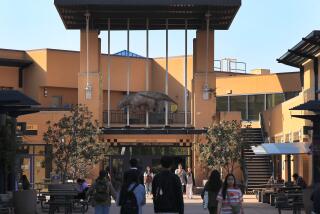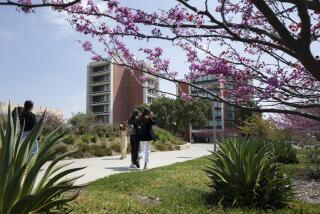Grads Seek a Refuge to Sit Out the Recession
College graduates hoping to ride out the recession and postpone the inevitable job search have applied to law schools in droves this year, stiffening competition for limited spots.
Across the country, applications have risen more than 22.6% to 80,795 by late March--the biggest annual increase in more than a decade, according to the nonprofit Law School Admissions Council.
Many law schools are still tallying their totals, with deadlines stretching into June at some campuses. But if the number of people taking the Law School Admissions Test is any indication, the application rates could continue to rise. The total number of test takers this year was 133,800, up 22.7% over last year.
Admissions officials attribute much of the increase in applications to the downturn in the economy, including fallout from the dot-com collapse and the September terrorist attacks. Many students are enrolling in law school to bide their time during the job market slump and to improve their chances for getting a job when the economy improves, admissions officials said.
Applicants’ Entrance Essays Focus on Sept. 11
“Before 9/11 and the collapse of the economy, there were a lot of consulting firms and companies that were snatching the top students and offering them jobs in accounting and marketing,” said Edward G. Tom, director of admissions at UC Berkeley’s Boalt Hall School of Law. “That’s not happening now with the current graduating class.”
The terrorist attacks also renewed interest in and respect for the legal profession, said Joyce Curll, assistant dean for admission and financial aid at Harvard Law School. About 50 applicants wrote essays saying Sept. 11 encouraged them to pursue careers as lawyers, she said.
“There are people who see the law as a way to make sense of the confusion and to make a difference,” Curll said.
Alison Betts, 28, said Sept. 11 influenced her decision, but in a different way.
“It made me realize that life is not eternal,” she said. “If I wanted to achieve this goal, now would be the time to jump on it.”
Betts, who spent the last several years modeling and acting in Los Angeles, said she had always thought about law school. The recent decline in entertainment jobs has put a strain on her career and prompted her to consider the legal profession more seriously.
Betts said she is eager for the challenge of law school, as well as the stable paycheck she expects a job as a lawyer would bring.
Increases have been seen in private, public, small and large schools. Harvard Law School applications rose by 19% over last year, with 6,945 applications received by March 15 for 550 spots. Berkeley’s law school has received 6,892 applications for 270 spaces, an increase of 22% over last year. Southwestern, in Los Angeles, has received 2,300 applications for 400 spaces, more than 40% more than last year. Pepperdine, meanwhile, received 2,800 applications by late March for 215 spaces, an increase of 22%.
Other types of graduate programs also had increases in applications, said Peter Syverson, vice president for research at the Council of Graduate Schools, which tracks enrollment nationwide.
The last time there was such an increase in graduate enrollment was in the mid-1980s, when the U.S. economy slowed and unemployment rates rose, according to Syverson. That was about the same time that the television show “L.A. Law” was popular and lured young people to the legal profession.
Many applicants to law school are straight out of college. Others are older and have been laid off from their jobs or are seeking a career change.
Dan McCall, 22, who majored in Asian studies at Georgetown University, said he realized that he couldn’t rely on his college degree and needed a graduate education to get a good, high-paying job.
“I definitely didn’t see an abundance of job opportunity,” said McCall, who has been working as a paralegal in Washington since graduating in May 2001. “Choices seem to be a little more restricted now. You can’t just leave college and hitch your wagon to one of those dot-coms.”
Though he’s not sure he wants to be a lawyer, McCall said he believes a law degree will help him in whatever career he chooses. McCall has been accepted to Georgetown Law School and is awaiting a letter from one more school.
Admissions Offices Being More Selective
The boom in applications doesn’t necessarily mean good news for prospective students. Competition is tougher and most campuses aren’t expanding their class size to meet the higher demand. Instead, admissions officers are taking the opportunity to be more selective and improve the quality of their entering class.
“It gives us a wider variety and range of candidates from which to select,” said Tom, of Boalt Hall School of Law.
Competition was already tough. Though 77,200 people applied to bar-approved law schools nationwide last year, only 45,100 ended up enrolling, according to the Law School Admissions Council, which includes 185 law schools approved by the American Bar Assn.
Like other law school admissions directors, Tom said he has been overwhelmed by the upsurge in applications. At many campuses, the mail bins are full, the phones ring constantly and admissions officers are working extra hours to read through the packets.
Admissions directors said they are trying to distinguish between students who are just looking for something to bide their time and those who are truly committed to the law.
Amy Hooper, 23, said that after getting a regular paycheck since graduating from Dartmouth College last year, she doesn’t see law school as a place to hide out for three years.
“The fact that I am going to be without an income for three years scares me more than it reassures me,” she said.
The renewed interest in graduate school has also meant a boom for companies that offer test preparation courses.
“As soon as things started crashing, we started getting phone calls,” said Shawn Domzalki, managing director of course services at the Princeton Review of Los Angeles.
“Everyone was wondering, ‘What am I going to do? Better go to law school or business school.’”
More to Read
Inside the business of entertainment
The Wide Shot brings you news, analysis and insights on everything from streaming wars to production — and what it all means for the future.
You may occasionally receive promotional content from the Los Angeles Times.










